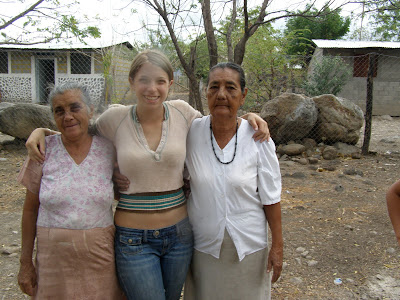Saludos! My name is Alice Ollstein, and I'm the coordinator this year of the Nicaragua Sister Partnership Committee of the Oberlin Student Cooperative Association, or OSCA. Our committee facilitates the relationship between OSCA and the National Union of Farmers and Ranchers, or UNAG, in San Juan de Limay, Nicaragua. Specifically, we've maintained a micro-loan fund for unionized female farmers in that area. Members can take out small loans to buy livestock, seed or other necessary items like school supplies for their children. When the loans are repaid, the money can be taken out by other women.
The relationship started with a cooperative in Vermont, which had set up a revolving micro-loan fund. The Vermont co-op dropped out of the relationship in 2002, leaving OSCA as the sole supporter of the project.
Every year the entire membership of OSCA — 620 members this year — must vote on whether or not to donate money to this loan fund and how much. Just last week, the students voted to give $5,000, and $2,000 of that will come from donations from each student's refund check. Because mail is so unreliable, the Winter Term delegations hand-deliver the checks to the women.
San Juan de Limay
San Juan de Limay is a small, rural town to the northwest of Estelí. It is the hottest, driest municipality in the region and has the highest poverty rates. Due to the scarcity of rain, farmers struggle to grow enough on the land to support their families and any livestock they own. The effects of global climate change are taking their toll here, with droughts making the land increasingly difficult to farm. Hurricane Mitch devastated the region in 1998 and many homes still show signs of destruction.
The U.S.-backed Contra Wars also hit San Juan de Limay especially hard because of its proximity to the Honduran boarder. Many have traumatic memories of the violence they witnessed.
Since it is so hard to make a living in San Juan de Limay, many of the men and women emigrate to Costa Rica or the United States. As a result, San Juan de Limay has almost no local industry. The people of San Juan de Limay make their living mostly through agricultural work, cultivating corn and raising cattle. Communication and travel is difficult. Few buses go to San Juan de Limay, so most travel by hitch-hiking. Some UNAG members in San Juan de Limay have told the Nicaragua Sister Partnership that UNAG is the only organization to have helped them.
Our Trip
Every other January Winter Term, OSCA sends a small group (4-5 students) down to Nicaragua to deliver our funds by hand and to strengthen and improve our relationship with the UNAG. The trip, planned by the delegates themselves, usually involves one week traveling and learning about the history of Nicaragua and two or more weeks with the UNAG, living with host families and learning how we can improve our partnership and the Loan Fund. Before the trip, the delegates fundraise to make the trip accessible to anyone.
The trip is not a service trip. We aren't going to impose any project on a community or tell them what we think is best for them. We are going to learn, to strengthen a long-standing relationship and to facilitate mutual understanding. On the trip two years ago, the delegates realized how poorly we understood the UNAG and how it functions, and how little the UNAG members knew about OSCA. The trip is important for fixing that, and for making sure they don't just see OSCA as this faceless organization that sends them money. We want to practice solidarity, not charity.
Please check back often as myself and the other delegates chronicle our trip!




